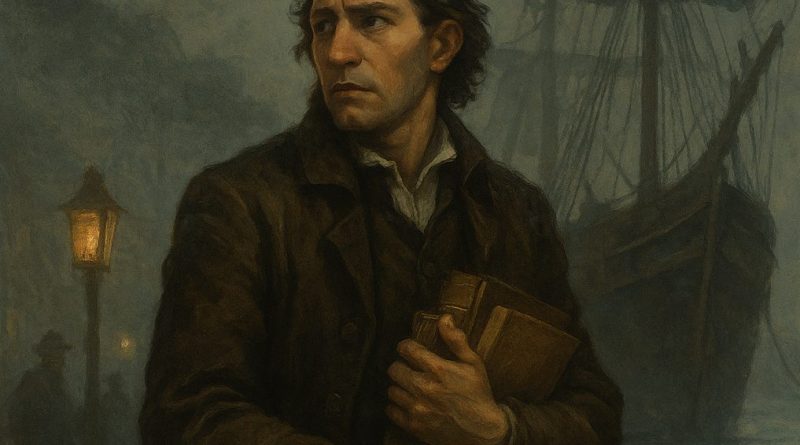A (Mostly) True Story
Andrew Hamilton glanced nervously over his shoulder as the fog thickened around the harbor of Leith. In the waning twilight, shapes blurred, and lanterns bobbed faintly, their pale glow swallowed by mist. It was early spring, 1697, a time when the chill of winter lingered stubbornly, its icy breath sharp against his face. Andrew’s heartbeat quickened; fear mingled with determination.
His political troubles began in Edinburgh, amidst swirling rumors of his involvement with Jacobite sympathizers, whose loyalties to the exiled Stuart monarchy were an open secret. William III’s government, deeply suspicious and quick to act, had begun to round up dissenters, both real and imagined. Andrew, unwilling to risk the tender mercies of the Crown’s justice, chose flight.
He clutched tighter at his sparse belongings—books, a little coin, and the papers of identity he had hastily forged. Tonight, he was Andrew Trent, an alias chosen with little consideration except expediency. “Hamilton” had become dangerous, a name that attracted scrutiny.
As the crew began loading barrels and crates onto the weathered brig, Andrew approached the captain—a surly Englishman who eyed him suspiciously.
“Passage?” asked the captain gruffly, his accent heavy with the working-class tones of London’s docks.
“Aye. To Virginia,” Andrew replied evenly, fighting the tremor in his voice.
“Indenture?” the captain queried bluntly, assessing Andrew with narrowed eyes.
Andrew hesitated only briefly. “Aye, if that’s what’s needed.”
The captain nodded sharply and produced a formal contract from his jacket pocket. “Five years’ labor in exchange for your crossing. Sign here.”
Andrew paused momentarily, scanning the document quickly in the dim lantern light. With a decisive breath, he signed “Andrew Trent,” and two sailors witnessed it silently. They shook hands, sealing Andrew’s fate and freedom in the same moment.
Weeks at sea were brutal—salt spray biting at every cut, the relentless motion of the Atlantic battering body and spirit alike. Andrew distracted himself by reading and rereading the few books he’d managed to bring. Quietly, he taught himself the rudiments of English common law, grasping for stability amid rolling seas and uncertain futures.
When at last they sighted the low, marshy shoreline of Accomack County, Virginia, relief surged through Andrew. The New World stretched before him, wild and daunting, but free from the shadow of the Tower and the hangman’s noose. Stepping onto the dock, Andrew breathed deeply, inhaling the earthy scent of marsh reeds and fresh pine, letting it anchor him in this new reality.
Under the indenture, he found work quickly—teaching children letters and numbers by day, burying himself in borrowed legal tomes by candlelight at night. Life was arduous, but Andrew relished his anonymity and opportunity. Gradually, he became known in Accomack not merely as Andrew Trent, the quiet, scholarly servant, but as a learned man whose opinions were respected, whose insights into law and governance were valued.
In the quiet evenings, looking westward across Chesapeake Bay, Andrew Hamilton allowed himself, once again, to dream. Virginia was merely the start. His name would rise anew, reclaiming pride and honor—this time, forged from his own merits in a land far removed from old grudges and royal suspicions.

